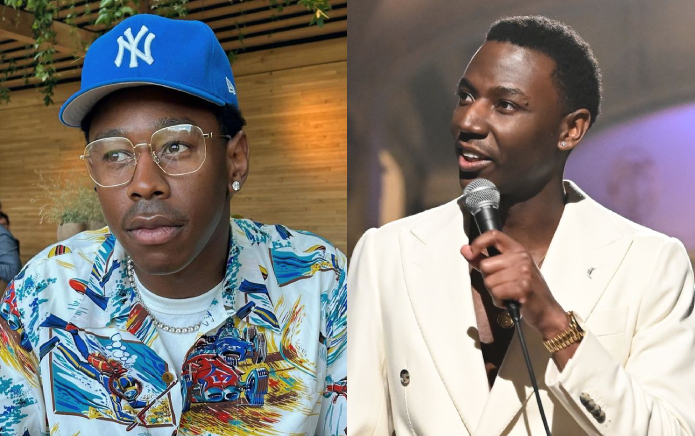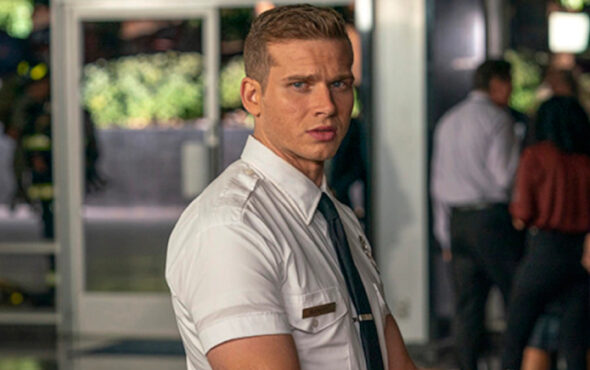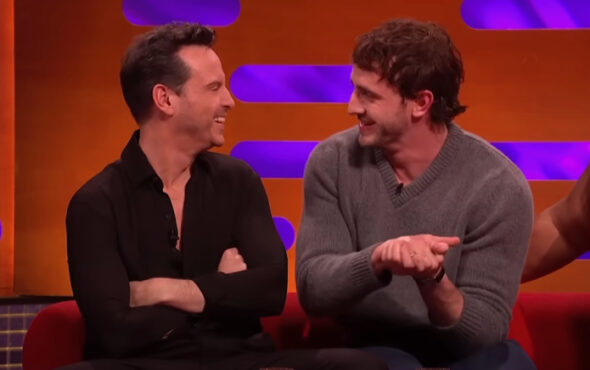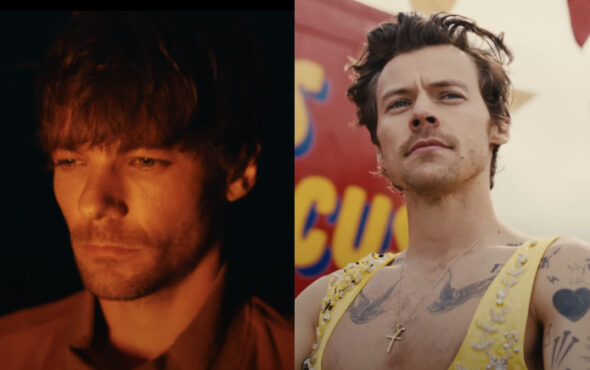
It’s mid-October and Scruffpuppie, aka JJ Shurbet, is cooped up in a New York Airbnb. Their backdrop is decorated with empty anodyne cream walls and a box-shaped room, leaning forward, the singer’s signature lilac tone hair comes into the frame. The last year for the 20-year-old has been an overdrive of exposure. A rising self-made star, Scruffpuppie’s name made rounds on the internet before it began to hit the mainstream. With over half a million views on their YouTube and promising presence on Soundcloud, it was only a matter of time until the Gen Z grunge-pop genre shifter got picked up. The singer’s debut Zombie Boy cemented her as one to watch, while her newer projects have reaffirmed her creative ingenuity as a dynamic front wave prodigy. Now, with a new full-length record on the way, under the watch of sad pop phenomenon Phoebe Bridgers, Scruffpuppie unpacks how drug dependency, internalised transphobia, and growing up shaped their outlook on music.
“With everything happening with the album and all the singles coming out, things are really starting to pick up the pace. This album is something that I have been really excited about,” JJ nods over Zoom. It’s late morning and JJ is, confessionally, exhausted, she casually mentions, smiling, pushing her spikey pastel purple fringe out her eyes; a habit she does throughout our chat. Despite the gruelling schedule, they are pleased things are starting to move ahead, especially, when she reveals the record was finished early “from March to April of this year”.
Her new record, a mesmerising multitude of folk, grunge, and acoustic inspirations, is a testament to Scruffpuppie’s evolved sound. “It’s a collection of songs that I’ve worked on for a little over two years,” the 20-year-old tells GAY TIMES. “A lot of them are adapted, especially since getting sober, since coming out as trans, and being more open about my sexuality and my identity. A lot of people are getting to see a completely different side of Scruffpuppie.”
GAY TIMES sat down with the promising artist to learn more about reconnecting with their fanbase, writing new music, and joining the acclaimed Saddest Factory Records roster.
You grew up in Paris, Texas, in a Christian home. How did that personal environment mould you as an artist?
I grew up going to church every Sunday and I absolutely dreaded it, except for when they would do worship. I am not a Christian person anymore, but specifically the way the music made my parents feel. That was the first thing that made me realize, ‘Oh wow, music that can make people cry, music can make people feel something, and that’s a beautiful fucking thing’. It’s what began to spark my love for music and love for the emotion that can be portrayed in music, regardless of whether it sticks strictly to Christianity or to anything else. Growing up in a Christian home wasn’t easy at all, having very strict parents. When I first started having the courage to come out and say I’m not straight, my parents were very against it at the time. That was when I was really young. So they thought I wasn’t old enough to determine that for myself yet which is clearly something that fucked me up.
A lot of my childhood established a lot of internalised homophobia and transphobia because my parents made me feel like it was wrong to feel that way. With the new album, my song October 14, talks a lot about my relationship with myself and becoming more comfortable in my identity and in my sexual orientation. Talking about how it was talked down upon and it’s cool that I adapted the song to talk about that because that song has made me cry for hours and hours. Originally, it was a song that didn’t mean anything that I just wrote a tiny baseline on in 2019. That song is definitely the most expressive about my identity and my orientation. I definitely wouldn’t have been able to write that song if it wasn’t for being raised in a Christian house.
You started out as an internet wunderkind making hits on YouTube and Soundcloud. Now you’ve signed to Phoebe Bridger’s Saddest Factory Records, do you feel your relationship with fans has changed at all?
It started changing as I continuously gained more traction from YouTube and started coming to California and doing things more on a professional level. When I first started out, I was just doing it for fun, and the views and stuff, that was not a bonus. I began developing a vision for what I wanted to do because everything that I was doing by myself, it was good, but it wasn’t enough. I wanted everybody to hear what I was doing. It has been hard, the difference and the interaction with my audience. I have lost a lot of loyal followers because I’m not as interactive. I still try to be it’s just not as easy as it used to be. Especially since there’s so many now, on YouTube and everything like coming out as trans and everything. Like, there’s a lot of people that like, are non-supportive of that and want me to go back to how I was two years ago. The Scruffpuppie who was writing songs in her basement two years ago, is still writing songs but in a basement somewhere else.
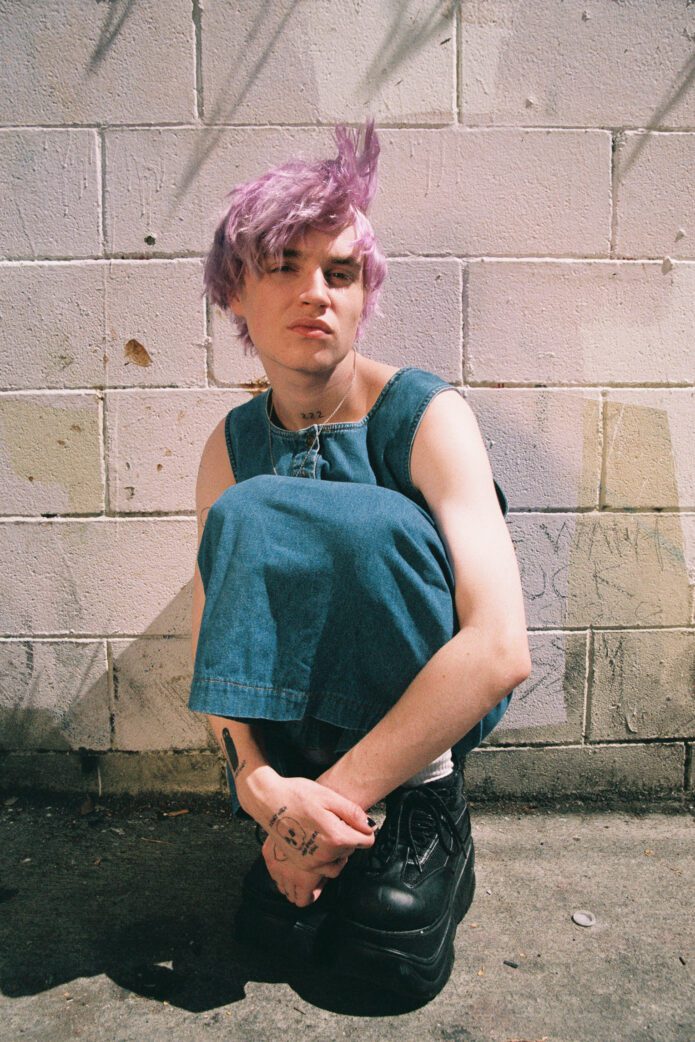
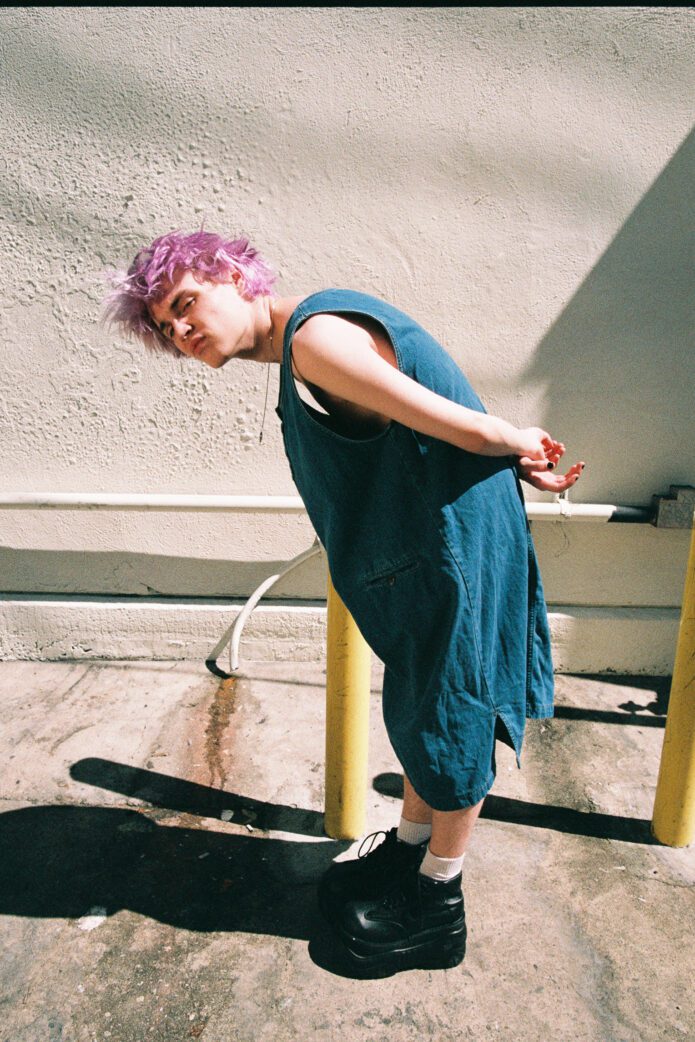
As an artist you unpack a lot of nuanced about your own addiction and overcoming drug use. Do you like to mirror your experiences through music?
Talking about those things isn’t something that I get to do a lot, except for in music, and especially with addiction. Addiction is a really hard thing to talk about with people because it’s a very selfish disease. I can’t deny that being an addict I’m a very selfish individual. Somedays all I can think about, when I wake up, is that I want to relapse. Some of the only ways I can smooth out the edges and make myself know that, that’s not what I need to do is by sitting down and writing a song. Whether it be experimental, or an acoustic indie song. I’m self-medicating in that sense. It’s a form of treatment for me.
There’s a startling lack of trans artist being giving a platform and making it big. Have you seen the industry change whilst you’ve been around?
Incredibly, especially in the hyperpop community. Influences like Sophie and osquinn. I don’t know if you just heard, but osquinn just dropped an album called Drive By Lullabies and it is one of my favourite projects of all time. Just listening to her music it’s such an inspiration to me. With coming out as trans, I’ve inspired a lot of individuals who are musicians, and who are fans of me to also like, express, their identity and be comfortable with doing that. It’s a really, really cool thing.
I will not disclose any names in this situation I’m about to talk about, but a hometown friend from, from somewhere in the United States where I lived, sent me a letter to my first apartment. They grew up in a very Christian house as well. They told me that they’re also an artist, I’m pretty sure. They were like ‘Yo, I don’t know if you remember me, but we went to church together. I just wanted to tell you that I’ve been listening to your music and I’ve been keeping up with you. I’m so proud of you for coming out and I’m not out yet.’ They basically told me that they changed their name and their pronouns. Being an inspiration to others to be comfortable being themselves is just such an amazing feeling.
You recently talked about being concerned you wouldn’t be able to make music sober. How are you finding it?
I proved myself wrong. It’s something I didn’t think was possible until I was in rehab. I wrote Assignment Song, I remember because I had to. My assignment was to write a song, and perform it in front of like, a meeting. I love the lyrics, but I didn’t get a guitar because I obviously wasn’t allowed to bring my own guitar. So like, one day, the counsellor who gave me the assignment brought his guitar and just handed it to me. And he was like ‘well, you have, do you have the assignment done?’ and I performed it in front of the class that day, the demo on YouTube was that version of that song. I remember thinking ‘Wow, this is way better than what I was doing like a month ago.’ That was where the hope began. After that I wrote, We Miss You, Even Though You’re Here, if you’ve heard that one, on the record. I was just overwhelmed with creativity. As I get further along in my sobriety, I realise that I’m able to do a lot more than I thought I was capable of without drugs. That’s a really alleviating feeling.
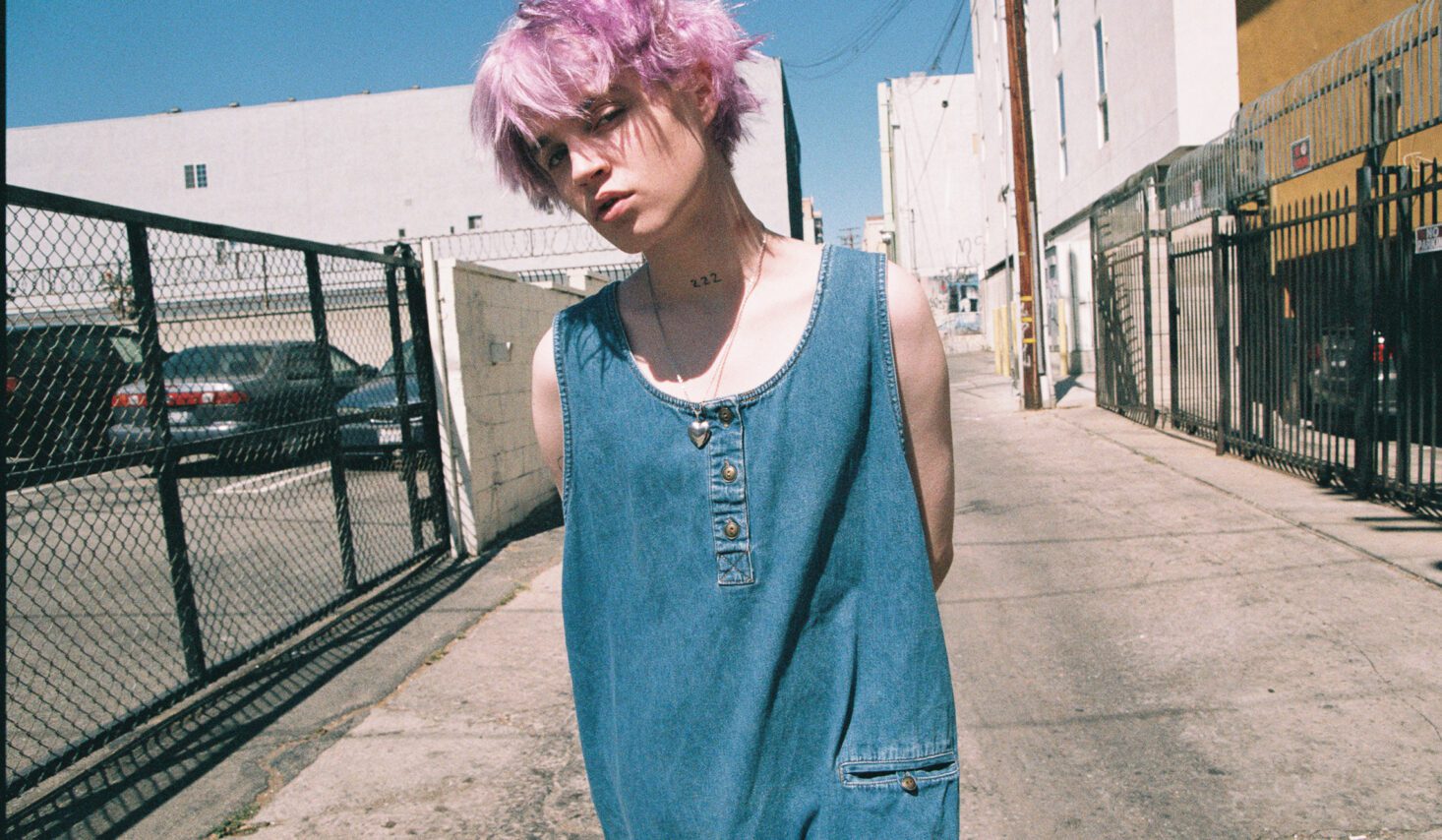
As a new signee to Saddest Factor Records, you’ve worked with Phoebe and Marshall Vore on this album. What was that experience like?
It was amazing. I didn’t work with Phoebe as much obviously because she’s a very, very busy woman. But when I did it was really cool being in the studio because we have the last song on the album together. We were just listening through the album and she was just like, ‘Can I sing this with you?’ I was like, obviously awestruck very very shocked. I wrote this song two years prior, during a very heavy drug binge and it found its way into the album. I wasn’t planning for it originally but I’m so fucking glad and hearing her singing my song in the same studio was just surreal. It was so cool.
Working with Marshall throughout the beginning of the year and the end of last year a little bit. We just kind of clicked immediately, like the first song we recorded was a lesson from the moon and I remember just listening to it over and over and over and over and over again because of how raw it was. How real it felt. It felt like what I had always wanted to do with never coming home and even zombie boy. Marshall is one of the biggest things that really made me say like ‘okay, yeah, it’s definitely going to be – Marshall is that he pulled out a four-track or something that we could run the audio tracks through like a tape sound. And he was like, ‘Let’s use this’ and I was like, yes! We have to use that because I’m obsessed with the lo-wi sound. I don’t know that’s always been a huge inspiration for my music with artists like Kitchen, Daniel Johnston, and Teen Suicide. A ton of lo-fi artists really inspired that whole sound design. Marshall was really good at helping me make it my own.
You’ve been very active on social media advocating for trans visibility and normalising conversation. Do you get concerned about online backlash?
Yeah of course that worries me. It’s never been a big concern. Because I know there’s always gonna be trends. I don’t know, if you saw on Twitter, like two days ago, I got posted by Keemstar a drama YouTuber because I called him smelly because he’s transphobic. I was getting death threats and people sending me my IP address. I guess I’m not really scared about my image as an artist being affected because I’m trans because that’s just who I am. Something that’s really ironic, I see a lot of the transphobic young kids comment some shit like ‘You’re a boy, not a girl’. Then I click on their profile and they’ll have a picture of Kurt Cobain with a quote that says, I would rather be hated for who I am than love for who I am not. That’s just really funny to me. Honestly, it’s kind of comedic. I think it’s funny that people don’t like me for being who I am.
Last of all, how do you want to be perceived as a future artist?
I’ve always wanted my music is to make people feel less alone. I want people to relate. I want people to know that they’re not the only person feeling some type of way. My favourite songs and my most popular songs have come out from times when I felt really alone and really scared. Scared that nobody would understand what I was feeling, or the way I was feeling. But then writing these songs, seeing the response, especially with affection, a lot of people- not even just with affection, like even with ego, which is a song about DMT- the idea that all art is up for interpretation is just beautiful to me. That song is about nothing more than a DMT breakthrough. A lot of people found comfort and find a home feeling in that song. I think that’s really beautiful that literally, anybody can find anything in whatever type of song. I just really want to be a comfort for some people.
